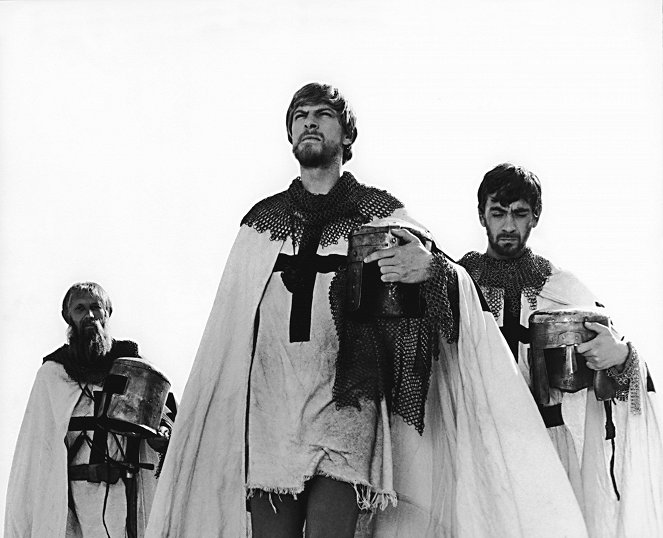Directed by:
František VláčilCinematography:
František UldrichComposer:
Zdeněk LiškaCast:
Petr Čepek, Jan Kačer, Věra Galatíková, Zdeněk Sedláček, Zdeněk Kryzánek, Jana Hájková, Michal Kožuch, Ladislav Gzela, Petr Štěpánek, Josef Somr, Miloš Willig (more)Plots(1)
It is the second half of the 13th century. The widowed master of a yeoman's stronghold, Vlkov, marries young Lenora. His twelve-year old son from his first marriage, Ondřej, gives his future "mother" a basket as a wedding gift with bats hidden among white flowers. The father, blinded by fury, flings the boy against a wall. Kneeling over the bleeding limp body, he then prays to the Virgin Mary, begging for the boy's recovery and promising he would give Ondřej to her service. The recovered boy is then taken to the North, to a castle, which is a site of a powerful crusader's order, its members eschewing women as well as all other profane temptations. Ondřej is befriended by Armin von Heide, an ascetic and fanatic who exaggerates the abstention almost masochistically. Years pass and Ondřej has become an adult. In the time of fasting, the order knight Rotgier escapes from the castle and Armin pursues him with the other men. Ondřej runs into the refugee by accident and their rushed talk ignites desire for freedom in him as well. Although Rotgier is caught and killed by a pack of hounds, Ondřej, too, decides to run away. He reaches as far as to Vlkov stronghold, where the widowed Lenora lives. The two people become close and decide to marry. Armin, following Ondřej close upon his heels, sneaks around the stronghold and enters it on the very wedding day. Lenora does not want to chase the unknown guest away and even kisses him in a friendly manner. In the evening, the fanatical man invades Lenora's bedroom and cuts her throat. Ondřej lets him be worried to death by dogs and he penitently returns to the site of the order. (official distributor synopsis)
(more)Reviews (8)
Bergman in a Czech version? At least that's how I see it, because Vláčil's gloomy and soiled vision of the Middle Ages brings him very close to the Swedish genius. Like the ceremonial nature of gesture and word, the weight of a single image that seems to say nothing and yet speaks through every detail. Körner's script is constructed masterfully, building a staircase stone by stone to the final tragedy that emerges from the almost harmonious celebration of medieval paganism. Čepek, Kačer and other actors from the Drama Club brought a touch of theatricality, slowness, emphasis on every word and act to the story. Zdeněk Liška, for his part, confirmed that he was an exceptional composer; however, sometimes strangely, his secular and religious musical accompaniment precisely colors a quietly buzzing drama about two sides of faith. Although The Valley of the Bees was quite ruthlessly stomped by New Wave, in time it proved the dominance of a complex artistic statement over the period filmmaking experiment. With all due respect to New Wave, this is just a class better.
()
The Valley of the Bees is a deeply philosophical movie. It is also very oppressive and impersonal, suppressing all emotions and feelings that a film could arouse in the audience. The result is that The Valley of the Bees is a perfect, raw depiction of the Middle Ages, the likes of which would be hard to find in Czech cinematography. And even though it lacks emotions, it is definitely a film that you must not miss, because it will convince you that all kinds of things used to be shot in Czechoslovakia in the past. And they had success with the audience then, so why shouldn’t they be appreciated today?
()
Much easier to grasp in terms of content than the poetic Markéta Lazarová, but at the same time less interesting and expressive. Many passages are too cold and emotionally empty, which may have been the intention given Vláčil's approach to the dark Middle Ages, but this time boredom creeps in more, its deadly effects countered primarily by the beautiful authentic music by master Liška. Fortunately, there’s the cast led by the amazing Čepek, chilling and raw sets, great costumes and a strong story that always manages to evoke exactly the right feelings. It's a pity that the script runs out of breath in the middle (though, fortunately, it gets it back by the end). 75%
()
Film treat that was created as a side product and poorer little brother of Marketa Lazarova. Basically, a very simple plot is shot poetically and at the same time rawly, it is an extraordinarily suggestive film experience with music perfectly tailored, excellent camera work, and great performances by Cepka and Kacer. In this film, however, the cliché "there are no small roles" perfectly holds true. I claim that if Údolí včel was shot in color, it would have been half as good, the black and white material co-creates the balladic atmosphere of the story.
Overall impression: 95%.
()
The story of a religious fanatic who does not hesitate to take up the sword for the glory of God and for whom the desire for a normal life is alien. It is hard to believe that this film was made mainly to use the costumes from Markéta Lazarová. The Valley of the Bees is equally exquisite, oozing the atmosphere of the 13th century, and Zdeněk Liška's music is unique as always.
()


Ads